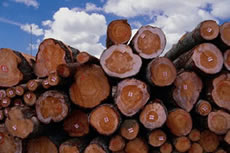|
Everyone's heard of rainforests and other old-growth forests. Why is it important that we not let all of these areas be cut down and converted to other purposes? How could actions that are often thousands of miles away affect us here in the US and in other western countries? How can the everyday actions of people like us help?
Today's Eco-Logical answers those questions. It was adapted from materials made available from the Rainforest Action Network, a group that campaigns for the forests, their inhabitants, and the natural systems that sustain life.
Rainforests are being destroyed at a staggering rate. According to the National Academy of Science, at least 50 million acres a year are lost—an area the size of England, Wales,
 and Scotland combined. All the primary rainforests in India, Bangladesh, Sri Lanka, and Haiti have been destroyed already. The Ivory Coast's rainforests have been almost completely logged. The Philippines lost 55% of its forest between 1960 and 1985; Thailand lost 45% of its forest between 1961 and 1985.
and Scotland combined. All the primary rainforests in India, Bangladesh, Sri Lanka, and Haiti have been destroyed already. The Ivory Coast's rainforests have been almost completely logged. The Philippines lost 55% of its forest between 1960 and 1985; Thailand lost 45% of its forest between 1961 and 1985.
Despite the small land area they cover, rainforests are home to about half of the 5 to 10 million plant and animal species on the globe. One fourth of the medicines available today owe their existence to plants. Seventy percent of the plants identified by the National Cancer Institute as useful in cancer treatment are found only in the rainforest; yet fewer than 1% of tropical forest species have been thoroughly examined for their chemical compounds.
Rainforests play a critical role in the atmosphere in part because they hold vast reserves of carbon in their vegetation. When rainforests are burned, or the trees are cut and left to decay, the carbon is released into the atmosphere as carbon dioxide (CO2). This is the second largest factor contributing to the greenhouse effect.
At this point, you may be convinced that rainforests are worth preserving, or at least that they shouldn't be gutted to supply us with wood and paper products that can be acquired elsewhere. Here are some things you can do to make sure you're not using "old-growth wood" in the wood and paper products you buy.
(1) Wood — Certified Sustainably Harvested Wood
Around the world, hundreds of private landowners, forest managers, manufacturers, and retailers now produce and supply wood products from well-managed forests. They are supported by a network of independent certification organizations that assess their management practices under a stringent set of environmental and social criteria.
 Producers and manufacturers who satisfy these criteria may apply the certifier's label to their product. Forest product certification provides a "chain of custody" to allow consumer tracking of products from forest to market, ensuring accountability of producers and cultivating trust among buyers.
Producers and manufacturers who satisfy these criteria may apply the certifier's label to their product. Forest product certification provides a "chain of custody" to allow consumer tracking of products from forest to market, ensuring accountability of producers and cultivating trust among buyers.
Certified harvested wood is competitively priced with non-certified wood. With all of these precautionary measures being taken on by the industry, there is absolutely no reason that old growth forests should continue to be destroyed. The Forest Stewardship Council (FSC) label is probably the best known "good label."
(2) Wood — Building Alternatives
Reclaimed Lumber/Recycled Wood: For non-weight-bearing features (window framing and deck planks, for example) consider reclaimed or recycled lumber. Reclaimed lumber, from houses, railroad tracks, and other sources, helps reduce waste while taking a burden off the forests of the world. It's cheaper than certified lumber, but can be harder to find.
Composite Lumber: The term "composite" lumber does not describe one specific product, but rather a broad range of materials with various qualities and characteristics. In general, it is made from recycled plastics and wood, although the amount of recycled content may vary widely. Competitively priced, it does not require finishing or sealing, will not rot, and is widely available.
Non-wood Choices: There is a growing list of non-wood options. In construction, lumber may be replaced with other materials such as concrete, stone, or straw bale as structural components. Homosote is a building material that is made out of recycled material that is chemical free and can be used for many structural materials ranging from exterior structural board to interior paneling. Earthen building techniques and other ecologically friendly technologies are continually being refined.
(3) Paper — Paper Alternatives
|
One alternative to virgin-fiber paper is recycled paper, preferrably with 100% "post consumer content," which means that the paper is truly "tree-free." The sidebar to the right shows recycled-paper products available on Amazon.com. Some office supply stores are also now stocking copier and paper made from recycled content—check the labels.
|
|
Another good tree-free choice is paper produced using alternative, non-wood fibers, such as kenaf, hemp, or agricultural residue. Kenaf is a fibrous African plant and serves as an excellent replacement for trees in paper making. It produces several times more paper per acre than tree farms and requires less chemical processing. Hemp and agricultural waste also produce high quality paper that is competitively priced—-though often hard to find in the marketplace.
For more information on how to actively reduce consumption of tree-based paper products, see Rainforest Action Network's Rainforest-Free Paper campaign.
Reconsidering our habits of consumption and lifestyle can open up many new and creative choices to help improve our world and the world of our children. Specifically, choosing paper with high levels of post-consumer recycled content and seeking out alternative lumber can help ensure that natural forests remain for all future generations.
| The Rainforest Action Network's mission is to protect tropical rainforests and the rights of those living in them. Visit them on the web at www.ran.org. |
|
|


